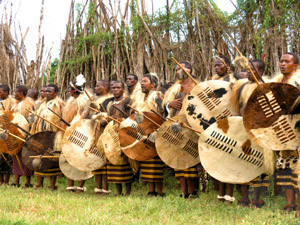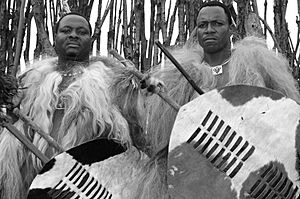Incwala facts for kids
Incwala is a very important ceremony in the Kingdom of Eswatini. It is a special event for the King and his people. This national celebration happens around the time of the summer solstice, which is the longest day of the year. The King of Eswatini is the most important person in Incwala. If there is no king, there is no Incwala.
The ceremony lasts for about a month. It starts with a smaller part called Incwala Lencane. It then builds up to the main event, Incwala Lenkhulu. Many special activities happen during this old tradition. These include fetching sacred water, gathering a special tree, and a bull-catching event.
Who Takes Part in Incwala?
The Incwala ceremony involves many important people.
The Bemanti (People of the Water)
The Bemanti are national priests. Their name means "people of the water" or "people of the sea." They are very important because they collect water from rivers and the sea. This water is used to make the King strong. The leader of the Bemanti is a chief from the Ndwandwe family. Other male relatives help him. These men travel to different rivers and the sea to gather water and special plants.
Tinsila (King's Blood-Brothers)
The tinsila are like special helpers or "artificial blood-brothers" to the King. The one on the King's left side is especially important. He stays with the King throughout the entire ceremony.
Princes and Chiefs
Princes and other chiefs who are not from the King's Dlamini family are also part of Incwala. They must be there, but they do not get too close to the King during the most important parts of the ceremony. Some powerful chiefs are not allowed to attend Incwala. This is because their strong personalities might clash with the King's. By staying away, they show that the Dlamini family and the King are supreme. However, some of their people must attend.
Regiments (The Nation's Warriors)
The regiments are groups of warriors and regular people from the nation. They play a big part in the public ceremonies. They stay in special camps in the capital city during Incwala. They come from all over the country, led by their chiefs. Their main role is to support the King.
Organizers of the Ceremony
The governors of the royal villages are in charge of organizing everything. They make sure Incwala happens on the right date. They also prepare all the tools and ingredients needed. They tell the whole nation when it's time for Incwala. Regimental officials help to gather people for each part of the ceremony.
Incwala Activities and Events
The Incwala ceremony has many different stages and activities.
The Bemanti's Journey
At the very beginning, the Bemanti set out on a journey. They carry sacred pots. One group travels to the sea, near Maputo in Mozambique. Another group goes to the Lusutfu, Komanzi, and Mbuluzi rivers. Their departure is a happy occasion.
As the Bemanti travel, they sometimes "pillage" the countryside. This is called kuhlamahlama. They might take any beer they find in people's homes. The fines for this are very small, like a pin or a small coin. People treat the Bemanti with great respect wherever they go. At each home where they stay, an animal is killed for them. People also give them large bowls of beer to help "support the work of kings."
Little Incwala (Incwala Lencane)
After their journey, the Bemanti arrive at Ludzidzini, the royal capital. The King and the Bemanti meet in the cattle yard. Special beer is brewed for them. The warriors wear special semi-Incwala clothes. These include cloaks made of cattle tails and black feathers in their hair. Their loincloths are made of leopard skin.
Their clothing looks like war dress, but during Incwala, men only carry plain sticks. They do not carry spears or clubs. This rule helps prevent fighting, as excitement can be very high. Older warriors slowly sing the first sacred song, called the "hand song." Women, including the King's wives and the Indlovukazi (Queen Mother), join in the singing and dancing. They wear new shawls and skirts. The sacred songs of the Little Incwala are followed by solemn songs called imigubho. These songs tell stories about history and teach important lessons. The ceremony ends with the singing of incaba kancofula, which is the national anthem of the Swazi people. For about 15 days after this, Incwala songs are sung in different royal homes around the country.
Lusekwane (The Sacred Tree)
The lusekwane marks the start of the Big Incwala. This is when young men go to fetch the sacred lusekwane tree. This tree is a type of acacia that grows in only a few places in Eswatini. It is always gathered from the same spot near the Bulunga Mountains.
Only young men who are considered "pure" can fetch the lusekwane. The Swazi people say this tree helps tell the difference between "pure" and "impure" men. Pure men are those who have not made any woman pregnant. The sacred trees are used to build a special enclosure for the main event. The lusekwane is cut at night, under the moon, and brought back to the royal capital in the morning.
After the young warriors return, they also collect imbondvo, which are leaves from a shrub. The sacred enclosure, called inhlambelo, is built using the lusekwane and imbondvo. This day is also known for a special event involving a bull called umdvutjulwa. Young men who fetched the sacred tree must catch this bull with their bare hands. This is a test of their strength and purity.
Big Incwala (Incwala Lenkhulu)
After the lusekwane ceremony, the great day of Big Incwala arrives. This day marks the end of the year. On this day, the King appears in all his glory. Only sacred Incwala songs are sung. Two songs are heard at once: a lullaby from the boys and a chant from the men and women.
By this time, the King is strong enough to "bite" the first crops of the new season. After he does this, his people can perform their own "first fruits" rituals. On this day, the King is called Silo, a special, powerful name.
The next day is a day of kubhacisa. People have restrictions on what they can do. The King stays hidden in the sacred enclosure. Warriors cannot shake hands. The King can only see his ritual wives.
The final day of Incwala is a day of purification. All old materials that are no longer needed are burned. These include parts of the umdvutjulwa bull, last year's gourd, and fines collected by the Bemanti. Warriors and women enter the cattle yard and sing and dance only the imigubho songs. All Incwala songs are now finished. As the people dance, they believe that rain must fall to put out the flames. No matter how heavy the storm, people do not seek shelter. They continue dancing until they are soaked. They finish the performance with incaba kancofula. The last day of Incwala ends with feasting and celebration.
A final task for the rulers is weeding the fields. Early the next morning, the warriors gather and sing march songs. They go to the Queen Mother's largest maize garden to weed it. This usually takes a few days. Then, the warriors slowly return to their homes. The King's permanent warriors move to the King's gardens and then to the queens' gardens. All over the country, local groups help their local chiefs. This shows the order of their society. Before people eat their new food, traditional leaders gather their families. They ritually eat the new season's crops. Chiefs who were important enough not to attend the King's Incwala have their own special ceremonies.
How Incwala Unites People
Incwala helps to bring people together in Swazi society. King Sobhuza II once wrote that when warriors dance and sing at Incwala, they feel like one group. This feeling helps them avoid fighting. It creates a sense of unity where individuals feel connected to the larger group.
 | Frances Mary Albrier |
 | Whitney Young |
 | Muhammad Ali |



